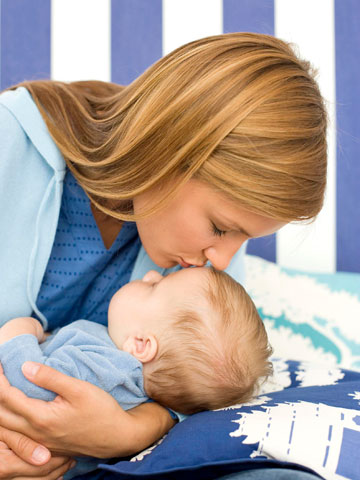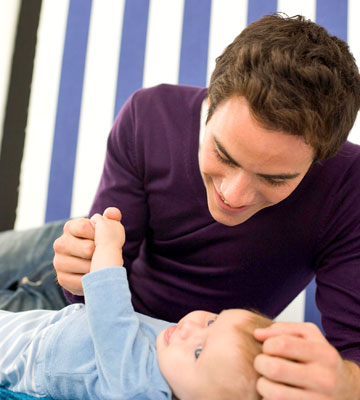
Bonding: What to Expect
You've probably heard stories about moms who fall madly in love with their babies as soon as they lay eyes on them. Although that's great, you shouldn't feel bad if it doesn't happen that way for you—bonding can be more complicated than it seems. We tackled some of your most common questions about this mysterious process.
Q. So what exactly does the phrase \”baby bonding\” mean?
A. This term gets thrown around a lot, but basically it just describes the special closeness that develops between a baby and her parents. Your infant already recognizes your voice and smell, and as long as you care for her and respond to her needs, her attachment should keep growing. "Bonding helps a baby feel secure and learn to trust other people—she knows that she can depend on someone," explains Parents advisor Jennifer Shu, MD, coauthor of Heading Home with Your Newborn, From Birth to Reality. "And this will affect how she relates to others later on in life and how she handles stress." You'll know your baby has bonded with you when she reaches for you when something happens, cries when you leave her, and coos in response to your voice.
Bonding isn't always so easy for moms, however. If you don't experience an intense love for your baby as soon as the doctor hands her over, don't worry: It can take time.
Q. I\’ve been home with my baby for a few weeks, but I still don\’t feel like I\’ve bonded. Is something wrong?
A. Not at all! There are lots of reasons moms don't bond immediately. If you were expecting a magical moment but didn't have one, that can throw you off. Bonding is much more subtle than that. Plus, the absolute exhaustion many moms experience in their first weeks home doesn't help. You may be so drained from your labor and delivery that you're unable to feel much of anything. "Before you can take care of anyone else, you need to take care of yourself," says Dr. Shu. "Tap into your support system—your husband, your mom, a babysitter, friends. Even getting a break for a few minutes can help." Something else to consider: Maybe you're just not an infant person. Not everyone has an easy time relating to a tiny newborn who does little more than eat, sleep, and cry. "It may be that you need to know your baby's personality before you can fall in love," says Dr. Shu. "Some moms say they don't truly bond until their baby begins smiling or even babbling at them." But if you're feeling depressed and disconnected from your infant, you should talk to your doctor. A good number of moms (and some dads too) suffer from postpartum depression. And you need to treat that to be emotionally available to your baby.

Q. My baby was born prematurely and is in the neonatal intensive care unit (NICU). How can I start bonding with him?
A. If your baby's in the NICU it doesn't mean that you need to kiss bonding goodbye. "As soon as you're allowed you should touch your baby as much as possible, even if you need to wear rubber gloves, while he's in an incubator," says Tiffany Field, PhD, child psychologist and director of the Touch Research Institute at the University of Miami Medical School Department of Pediatrics. Skin-to-skin contact is especially important for a premature newborn's emotional and physical health. "Even the youngest babies crave human contact," says Dr. Field. That's why NICU nurses encourage moms to start kangaroo care (holding your baby with his bare chest against yours) as soon as possible. Studies have found that preemies who are held in this way gain weight and develop faster and have lower stress levels.
Q. I\’m going back to work and putting my baby in daycare. Is it crazy to be afraid that we\’ll drift apart?
A. No, it's a normal concern, but don't worry. Your baby's not going to forget you. You should realize, though, that she will—and should—bond with other people. Look for a daycare center where there's one primary caregiver rather than a rotating staff, suggests Lawrence Cohen, PhD, author of Playful Parenting. It will be less confusing for her if she forms a special connection with one person. And don't worry if your baby has a meltdown at the end of the day. That doesn't mean that you picked a bad center or that she doesn't want to see you. "It's actually a good sign of a strong attachment," says Dr. Cohen. "She saved some of her upset feelings to share with Mom or Dad." Don't think you have to make every second fun when you get home, either. Your baby might benefit more from some low-key time with you.

Dads & Bonding
Moms aren't the only ones who need to bond with their babies, but dads may have to work a little harder at it. Child psychologist Lawrence Cohen, PhD, offers this advice.
Parents Magazine





